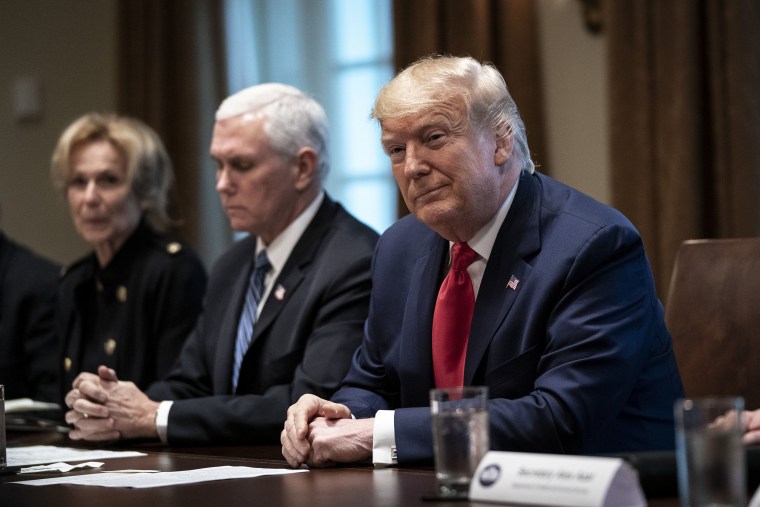During a Fox News interview last week, Donald Trump told Sean Hannity that he recently struggled with a decision about bringing Americans with the coronavirus back to U.S. soil. To hear the president tell it, he "hated to do it statistically," adding that the question on his mind at the time was, "Is it going to look bad?"
As we discussed soon after, in context, Trump seemed to be suggesting that he had certain talking points he wanted to use and was concerned about ailing American patients messing up his political message.
Late last week, during a visit to the Centers for Disease Control in Atlanta, the president was even less subtle on this point. As part of a discussion about a cruise ship with Americans on board, Trump told reporters:
"I would rather -- because I like the numbers being where they are. I don't need to have the numbers double because of one ship.... I'd rather have them stay on [the ship], personally."
Soon after, a reporter asked the question on the minds of many: wouldn't it be a mistake to prioritize "attractive numbers" over treating ailing Americans? The president insisted that treatment would be a higher priority than his interest in specific tallies -- before quickly adding how much emphasis he places on the numbers.
"I like the numbers. I would rather have the numbers stay where they are. But if [public-health officials] want to take them off [the ship], they'll take them off. But if that happens, all of a sudden, your 240 is obviously going to be a much higher number, and probably the 11 will be a higher number too."
It's easy to imagine an investigative reporter convincing a high-level White House source to leak a devastating anecdote along these lines. "Behind the scenes," the report would read, "Trump's principal focus is less on public health and more on political metrics and the impact infection rates have on political talking points."
Except in this case, there's no need for an investigative reporter to dig up such a damaging revelation -- because Trump is willing to say it out loud, on the record, and on camera, indifferent to how unsettling it is to see a president respond to a crisis this way.
Ordinarily, evidence of the president maintaining a data-driven focus might seem encouraging, but that's not the case with the coronavirus outbreak. While a healthy data-driven focus uses evidence and statistics to help guide decision making, Trump prefers to pick numbers he likes for public-relations purposes and then urges officials to prioritize his conclusions.
A Washington Post analysis added over the weekend, in reference to the president's rhetoric in Atlanta, "It was the sort of admission that someone makes when they may not even be aware that they're admitting to something. In this case that admission was straightforward: Trump is as -- or more -- concerned about the political fallout of the growing number of coronavirus cases in the United States as he is about how those cases should be handled."
Among the lingering, awkward questions is just how far the president might be willing to go in order to maintain the more politically convenient "numbers" he "likes." MSNBC's Chris Hayes questioned last week, for example, whether inadequate coronavirus testing may be part of "an intentional strategy to keep the numbers artificially low."
The Post's analysis added on Saturday, "[I]t's hard to uncouple [a delay in virus testing] from Trump's obvious desire to keep numbers low. Sure, there are only a few hundred known cases in the United States, but the key word there is 'known.' Experts think the virus has been in the wild in Washington for weeks -- meaning many cases that haven't yet been detected there alone. If you don't test for the illness, you can't know how many people have it. And if you don't know how many people have it, the low numbers you tout on Twitter are obviously incomplete."
